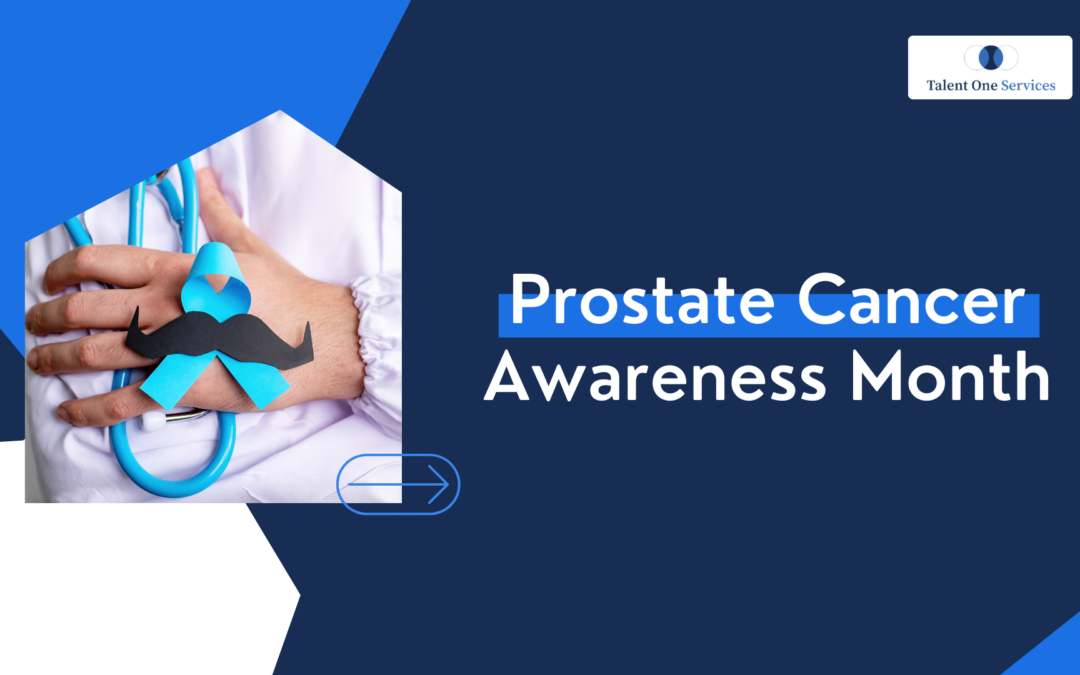We are committed to updating you on the latest opportunities and essential topics in the healthcare staffing industry. This month, we highlight the importance of Prostate Cancer Awareness.
Prostate Cancer Awareness: Know the Facts, Take Action
Prostate cancer is a serious health issue that affects millions of men worldwide. Early detection and understanding of the disease are crucial for effective treatment and management. Here’s what you need to know about prostate cancer and how to stay proactive about your health:
What is Prostate Cancer?
Prostate cancer occurs when cells in the prostate, a small gland located below the bladder and in front of the rectum, begin to grow uncontrollably. The prostate is responsible for producing seminal fluid, which nourishes and transports sperm.
Risk Factors
While the exact cause of prostate cancer is not known, several factors may increase your risk:
- Age: The risk increases with age, particularly after 50.
- Family History: Having a father or brother with prostate cancer can increase your risk.
- Race/Ethnicity: Prostate cancer is more common in African American men compared to Caucasian or Asian men.
- Genetics: Certain genetic mutations can contribute to the risk.
Symptoms
In its early stages, prostate cancer may not show any symptoms. However, as it progresses, you might experience:
- Difficulty urinating
- Frequent urination, especially at night
- Painful urination
- Blood in urine or semen
- Pain in the back, hips, or pelvis
- Erectile dysfunction
Screening and Diagnosis
Regular screening can help detect prostate cancer early, when it’s most treatable. Screening methods include:
- Prostate-Specific Antigen (PSA) Test: Measures the level of PSA in the blood, which can be elevated in prostate cancer.
- Digital Rectal Exam (DRE): A doctor feels the prostate through the rectum to check for abnormalities.
If screening results are abnormal, further tests such as a prostate biopsy may be recommended to confirm a diagnosis.
Prevention and Management
While there’s no sure way to prevent prostate cancer, you can take steps to reduce your risk:
- Healthy Diet: Eat a balanced diet rich in fruits, vegetables, and whole grains. Reduce intake of high-fat foods and red meat.
- Regular Exercise: Engage in physical activity to maintain a healthy weight and improve overall well-being.
- Routine Check-ups: Regular check-ups with your healthcare provider can help catch potential issues early.
Treatment Options
Treatment for prostate cancer depends on the stage of the disease and may include:
- Surgery: Removal of the prostate gland.
- Radiation Therapy: Using high-energy rays to kill cancer cells.
- Hormone Therapy: Reducing or blocking hormones that fuel cancer growth.
- Chemotherapy: Using drugs to kill cancer cells or stop them from growing.
- Active Surveillance: Monitoring the cancer closely and delaying treatment if the cancer is not causing symptoms.
Support and Resources
Facing a prostate cancer diagnosis can be overwhelming, but you don’t have to go through it alone. Seek support from:
- Healthcare Professionals: Talk to your doctor about your treatment options and care plan.
- Support Groups: Connect with others who are going through similar experiences.
- Educational Resources: Learn more from reputable organizations such as the American Cancer Society or Prostate Cancer Foundation.
Take Action Today
Prostate cancer awareness is about empowering yourself with knowledge and taking proactive steps towards your health. Discuss with your healthcare provider about your risk factors and the best approach to monitoring your prostate health.
Your health is your greatest asset—stay informed, stay proactive, and take control.
